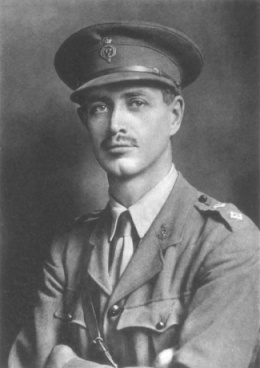Dr Kathryn Rix, Assistant Editor of the Commons 1832-68 Section continues with her series on MPs who died during WWI. Today we remember Captain Oswald Cawley who was killed in action in northern France on this day in 1918…

On 20 June 1918 the former MP for Prestwich, Lord Cawley, watched from the peers’ gallery as his successor in the seat was sworn in as a member of the House of Commons. Dressed ‘in khaki, a lieutenant, a tall, manly figure’, the new MP was Cawley’s youngest son, Oswald, who had been elected in his father’s place that January. However, his parliamentary career was short-lived, as he was killed on 22 August 1918 while serving in northern France with the 10th King’s Shropshire Light Infantry, in which he had recently been promoted to captain. This was the same regiment as another of the MPs killed during the war, Philip Kirkland Glazebrook.
Cawley was initially reported as missing and wounded. His commanding officer wrote to his parents that
Your son was hit in the arm, which he got dressed by his Company stretcher-bearers, and then went on and was wounded again the second time in the jaw, and after that we could hear no news, and we had to fall back to our old line … I hear your son was seen gallantly leading a charge, and then a mêlée ensued. All the Officers were casualties. Your son is one of my best and most reliable Officers. He has only been in command of a Company a few weeks, but I look upon him as one of the best Company Commanders.
When Cawley’s death was confirmed, fellow officers also paid tribute to him, with one remembering that
He seemed to know every man in the Company, who and what he was in civilian life, and all about him … The men thoroughly appreciated his interest in them, and they would have done anything for him. They regarded him, too, as absolutely fearless.
Cawley’s brief parliamentary career contrasted with the 23 years his father, Frederick, had spent in the Commons as Prestwich’s MP before his elevation to the peerage in January 1918. It was initially suggested that Cawley’s oldest brother, Robert, should be invited to stand in their father’s place as the Liberal candidate, but he was busy with the management of the family business, the Heaton Mills Bleaching Company. Oswald Cawley, who had joined the Shropshire yeomanry shortly before the war broke out, was then serving in Palestine, but sent a telegram agreeing to stand, on condition that he would not be expected to abandon his military duties.
He had relatively little experience of politics, although he had been president of the Palmerston Club while studying at Oxford University and had ‘created a most favourable impression as a speaker at Liberal gatherings’ before the war. After leaving Oxford he had spent time travelling abroad, including to Germany, India and Japan, and in September 1911 his name appeared alongside his father on the passenger lists of RMS Olympic (sister ship of the Titanic) for a voyage from Southampton to New York. He had assisted with the management of his father’s firm and undertaken some philanthropic work in Prestwich, notably with lads’ clubs and the Boy Scouts.
Although he was a Liberal, at the January 1918 by-election Cawley also secured the support of the local Conservatives as part of the wartime coalition, and the National Labour Executive agreed to observe the wartime party truce. He did, however, face an opponent, Henry May, secretary of the recently established Central Co-operative Parliamentary Representation Committee. Despite being absent on military service, Cawley won the by-election with a decisive majority, polling three times as many votes as his rival. He subsequently cabled from Cairo to thank those who had campaigned for him. In March, when he was in hospital suffering from fever, he informed the Prestwich Liberals that he would apply for leave to come home and take his seat. This was delayed because his regiment, which had fought at Gaza and Jerusalem, was posted to France, and it was not until June that he finally appeared at Westminster. After a short period of leave, he returned to ‘the thick of the fray’ in France, and announced that ‘if he comes safely through the big push’, he would stand for the newly created Manchester Blackley constituency at the next general election.

Cawley was the second of his father’s sons to follow him into the Commons and, tragically, the third of his sons to die while serving in the First World War. Harold Thomas Cawley (1878-1915), Liberal MP for Heywood from January 1910, was killed in action at Gallipoli in September 1915, the fourth MP to die while fighting in the war. Frederick Cawley’s third son, Major Stephen John Cawley (1879-1914), a career soldier, had been killed in September 1914 while serving with the British Expeditionary Force in France. Instead of being buried close to where he fell, Oswald Cawley was re-united with his brother Stephen, joining him in a vault at Nery Communal Cemetery. The three brothers were also commemorated by a memorial at Eye Parish Church, Herefordshire, close to Lord Cawley’s home at Berrington Hall.
KR
For more from Kathryn’s Section be sure to look at the Victorian Commons blog and follow them on Twitter.
